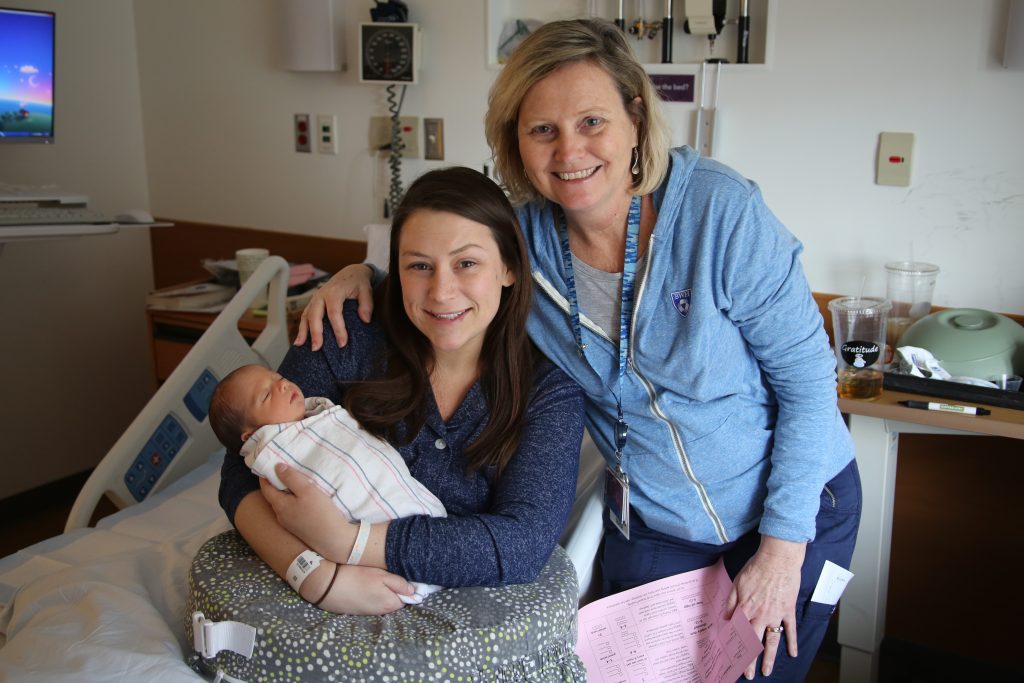Brigham Achieves Baby-Friendly Hospital Designation

Chelsea Thomson (center) and baby Rio share a moment with nurse Maureen Kent while reviewing breastfeeding tips.
On Jan. 23, Brigham and Women’s Hospital was awarded Baby-Friendly Hospital designation in recognition of its exceptional evidence-based, patient-centered care and education around infant feeding practices.
Launched in 1991 by the World Health Organization (WHO) and the United Nations Children’s Fund (UNICEF), the Baby-Friendly Hospital Initiative recognizes hospitals and birthing centers that offer mothers the information, confidence and skills needed to successfully initiate and continue breastfeeding their babies or to safely feed with formula. This means ensuring a baby receives the right amount of formula to meet his or her nutritional needs, that formula is prepared without risk of contamination and that bottles are kept clean and sterile.
The Brigham is now among approximately 550 hospitals and birth centers nationwide that have received this prestigious designation from Baby-Friendly USA, the program’s accrediting body, following a site visit by assessors at the Mary Horrigan Connors Center for Women and Newborns last fall.

“This milestone builds upon our strong foundation of excellence in maternal and infant care, dating back to 1832 with the opening of our predecessor hospital, the Boston Lying-in, as one of the nation’s first maternity hospitals,” said Maddy Pearson, DNP, RN, NEA-BC, chief nursing officer and senior vice president of Patient Care Services. “With this new designation, we officially join other Baby-Friendly Hospitals in leading the way to ensure that mothers receive the information and support they need to safely and successfully meet their infant’s nutritional needs, whether that means breastfeeding, formula feeding or a combination of the two.”
The journey to receive Baby-Friendly Hospital designation has been propelled by the enthusiastic support of faculty and staff across the Connors Center, said Sue Bryant, MSN, lactation consultant and Baby-Friendly project lead.
“This has truly been a collaborative effort across multiple disciplines, and, in particular, this designation would not have been possible without the evidence-based practice change that our nurses embraced,” Bryant said.
Katherine Gregory, PhD, RN, associate chief nursing officer for the Connors Center, expressed her appreciation for the many people whose efforts helped the Brigham achieve this recognition.
“I am incredibly proud of our entire CWN and Brigham team who made the journey to our Baby-Friendly designation a success,” Gregory said. “It’s a celebration of our practice and the care we provide to mothers and babies at the Brigham.”
Baby-Friendly and Mother-Friendly
The Baby-Friendly initiative is rooted in two sets of guidelines developed by the WHO and UNICEF: “Ten Steps to Successful Breastfeeding” and “The International Code of Marketing of Breast-Milk Alternatives.” The former is a framework of evidence-based practices shown to increase breastfeeding initiation and duration. The marketing code defines how hospitals and birthing centers may obtain infant formula. To ensure infant-feeding practices and education are not affected by commercial interests, Baby-Friendly Hospitals do not receive free or discounted products from formula manufacturers.
Another core tenet of Baby-Friendly Hospitals is “rooming-in,” a practice that enhances mother-infant bonding by having the baby stay in the mother’s hospital room as much as possible. Rooming-in also gives mothers greater exposure to their baby’s feeding cues under the expert guidance of the care team. The Brigham’s nursery continues to be a resource for patients and families upon request and when medically indicated.
As with all types of care and education, patients and families are at the heart of every practice around infant feeding, Pearson said.
“It’s important to note that while the designation is called Baby-Friendly, we are equally committed to being mother-friendly,” she said. “We respect every woman’s choice about how to feed her infant and will do everything possible to support them while they are in our care.”
Bryant agreed: “We’re committed to helping families achieve the best start for all babies.”

Leave a Reply